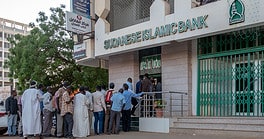Where might the next shoe drop in the banking sector?Accelerate CEO and ETF specialist Julian Klymochko has some surprising answers.

Accelerate Financial Technologies had a short position in Signature Bank (now part of New York Community Bancorp) and made a profit when the stock price was worth zero. Signature Bank, it turns out, was one of two US banks that the Federal Deposit Insurance Corp. recently shut down—the other being Silicon Valley Bank. The two banks, although small, seemed to set off a chain reaction.
First Republic and Credit Suisse also came under scrutiny after SVB’s situation triggered worries over other regional banks with uninsured deposits. While First Republic received a substantial capital injection from a consortium of bank brethren—including JP Morgan Chase & Co., Morgan Stanley, Citigroup, Bank of America and Wells Fargo—Credit Suisse opted for a quick sale to UBS.
In light of the continuous developments, Global Finance asked Accelerate CEO and ETF specialist Julian Klymochko to discuss the various scenarios, considering he had a front-row seat for at least one of the banks in question. Read on to hear his thoughts on what effect these rescues, in their various forms, will have on the global markets, whether more “bank failures” are on the way and who’s ready to take market share.
Global Finance: Were you surprised by the recent spate of bank failures?
Julian Klymochko: The failure of Silicon Valley Bank (SVB) and Signature Bank was not surprising. SVB was technically insolvent last quarter, given the rise in interest rates and the corresponding decline in its Treasury and Mortgage Backed Securities portfolio. The Accelerate Absolute Return Hedge Fund ETF (TSX: HDGE) had a short position in Signature Bank, totaling $0.00. I don’t think the recent bank failures were moral hazards as the stockholders lost everything, and management did poorly. The creditors (depositors) got bailed out, which was necessary to save the financial system. However, hopefully, it was a lesson learned to depositors that they are bank creditors and should conduct the requisite due diligence before committing funds to that institution. Uninsured bank deposits are not risk-free.
GF: Was there no other option besides a $17 billion wipeout (and subsequent rescue) of Credit Suisse?
Klymochko: There was a bank run on Credit Suisse. It was rumored to lose $10 billion of deposits per day last week. It was likely to fail shortly, and the Swiss Government stepped in to orchestrate a bailout by forcing the sale of Credit Suisse to competitor UBS and backstopping some of the downside risks. Given the timeliness of the crisis and the potential failure of Credit Suisse, there was no other option for the firm.
GF: The Credit Suisse situation hints that global stakes exist, but waters are calmer in Canada. Are there no vulnerabilities among the big five (Royal Bank, TD Bank, Scotiabank, the Bank of Montreal and CIBC)?
Klymochko: Credit Suisse had many significant losses over the past several years that put it in a very weak capital position, including the Greensill fraud, the Archegos Capital blow-up and the Mozambique tuna-bond scandal, amongst others. Clients and investors lost faith in Credit Suisse, and a bank run occurred. The ironic aspect of the current banking crisis is that deposits leave the weak banks and flow to the strong ones. I expect Canada’s “Big Five,” particularly those with a large US presence, to take advantage of the crisis and gain market share. The banking crisis is bad for small banks and good for large banks (assuming they are well-managed).
GF: Are hedge funds like Accelerate expected to feel any ripple effect from the current goings-on?
Klymochko: Certainly, the banking crisis has led to an increase in volatility. It has been positive for certain asset classes, including gold and Bitcoin, along with short positions in banks. Conversely, it has been negative for other assets, such as bank stocks and value equities. Thus far, Accelerate has not had any material effects from the current market volatility, given its diversified suite of alternative investment solutions.
GF: Is this a contagion, and if so, do you expect more ‘bank rescues’ in the immediate future?
Klymochko: There is no contagion for the market as a whole, but certainly some contagion among regional banks. Depositors are spooked and have been withdrawing funds from smaller banks. We will see more bank rescues soon as more bank runs occur and the current banking crisis plays out.
GF: We saw a bunch of financial giants rescue First Republic, but not the others. So why do some banks get taken over and survive, but others are not taken over?
Klymochko: Many considerations go into which banks get bailed out or acquired, including asset quality, relationships, size, business lines, etc. Therefore, it is challenging to discern which will get rescued and which won’t, and if one does get rescued, if there will be any value for shareholders.



